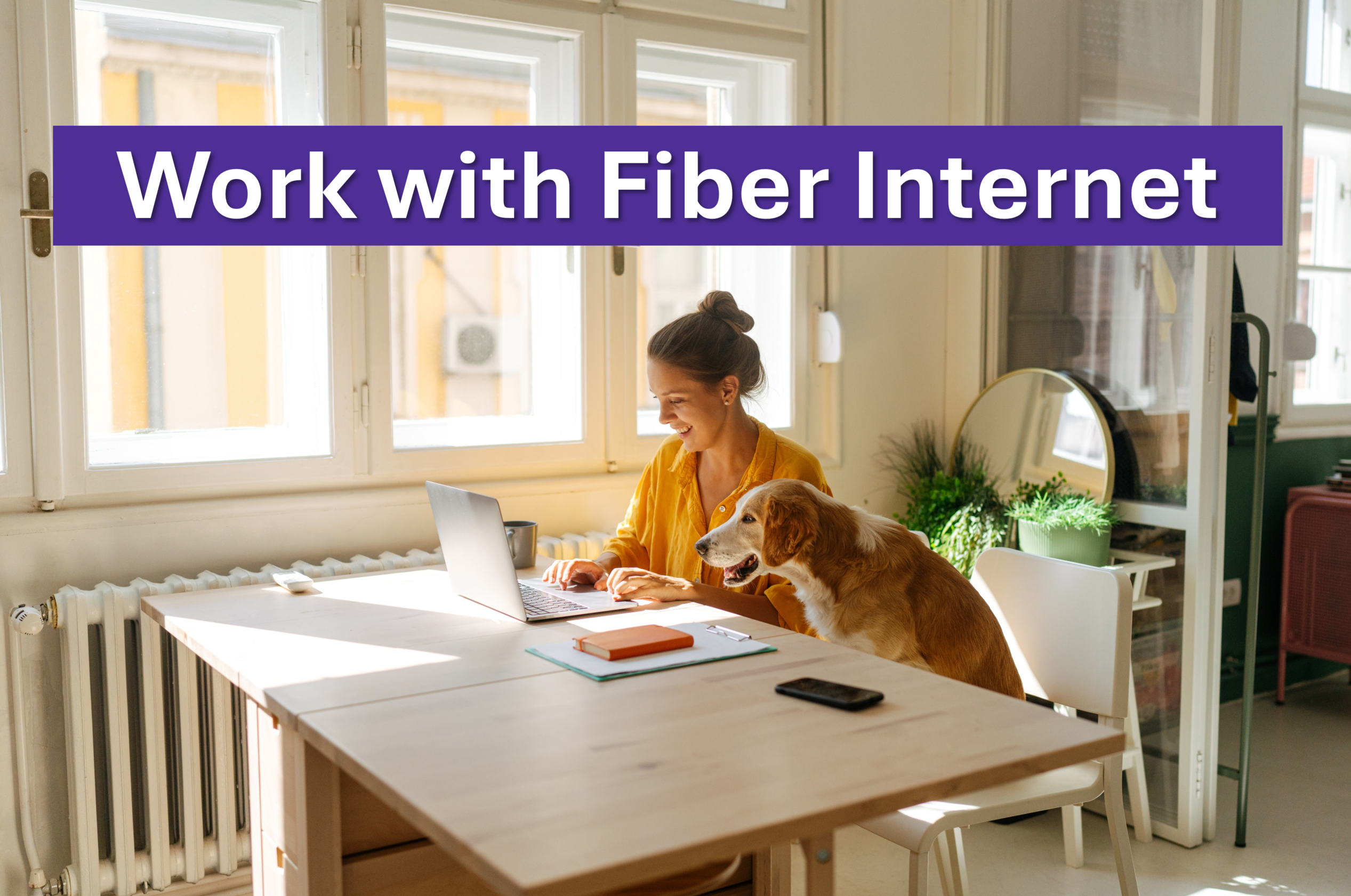Working remotely, full-time or in a hybrid capacity, is the new norm. If you’re taking video calls and logging in to secure networks from your home office, you may need to upgrade your internet connection to maximize your productivity and ensure a safe, reliable connection.
What is a fast internet speed for working from home?
One of the main advantages of working from an office is the speed and reliability of business-class internet services. Offices typically have multiple users, high security, and large data files, so they invest in the fastest possible connections. So, what’s a good internet speed for working from home? And how can you get business-level, high-speed internet for your home office?
To determine a good internet speed for working from home, start with a 50 megabits per second (Mbps) baseline. That’s enough speed to perform high-def video conferencing. But it might not be the boost you need if you have to share the connection with other devices (or a roommate or partner who also works from home) or if you frequently work with large files.
Depending on where you live and the available providers, home office internet typically comes in one of three forms:
- DSL: Depending on a number of factors including your location, you may not be able to reach speeds of 50 Mbps because DSL speed depends in part on your distance from the provider’s hub.
- Cable: You may notice fluctuations in speed during peak usage hours. Some cable providers intentionally throttle internet speeds at specific times to keep the system from becoming overloaded. Quantum Fiber has so much bandwidth that we don’t need to throttle your speeds to ensure reliable service.
- Fiber: For the ultimate internet experience, fiber is a fast and reliable option. Fiber uses light pulses to transmit information. As a result, it’s stable and consistent. Once light pulses leave the hub, they don’t require an electrified line to reach your home, so power outages along the way won’t disrupt your service.

Symmetrical internet speeds
One major drawback to some home internet is that speeds are “asymmetrical.” That means the system is set up so download speeds (how fast incoming information can be received) are much faster than upload speeds (how fast information can be sent to other devices or servers). To put that into perspective, a cable connection with download speeds of 25 Mbps may have upload speeds of less than 1 Mbps. For many people, that’s sufficient because the average home user downloads more often than they upload.
Asymmetrical connections can cause issues if you work from home. For instance, video conferencing requires a “two-way” street for data. You must upload your video stream while downloading the incoming one. As a result, if your job involves a lot of face time, slow upload speeds may not give you enough internet speed to work from home. That’s also the case if you regularly send large files, such as image galleries, videos, and databases to coworkers or clients.
That’s where a fiber-optic internet connection comes in. Because fiber has symmetrical speeds, it can offer much higher upload speeds than other connections with similar maximum download speeds. A fiber connection may even offer completely symmetrical speeds so you can upload long videos or other sizeable files in seconds.
How do I know if my internet connection is secure?
Another advantage of business-class, reliable home internet is that it provides a secure internet connection. Businesses typically go to great lengths to ensure their data is protected. Depending on your employer’s rules, you may be required to set up extra security measures on your connection if you intend to work remotely.
When working from home, you should always:
- Encrypt your devices
- Use a strong (unique) password on your home WiFi
- Make sure your WiFi is WPA2-encrypted
- Use a password manager
- Enable two-factor authentication on your work accounts
- Use a work-issued device for work only, never for personal tasks like shopping
How to secure your home internet connection
You can further enhance your home cybersecurity using a virtual private network (VPN). This software creates a secure, encrypted tunnel that makes it harder to intercept your data. VPNs are essential for connecting remotely to servers and other onsite resources at your workplace.
If you don’t already have a VPN and don’t want to pay for one, ask your employer to supply you with one. Many companies make them available to remote workers to help protect sensitive company data.
Other advantages of securing your home internet connection
Another benefit of VPN access is that it can help protect your data when you’re not at home. If you travel for work, a VPN makes it more secure to work from coffee shops, hotels, and airports. VPNs offer another advantage—they hide your IP address from internet providers.
Many VPN services let you install the software on multiple devices. That way, you can enjoy the other benefits of a VPN on your personal devices.

Put fiber internet to work for your home office
Fiber internet gives you the advantages of business-class internet at home. You’ll enjoy excellent internet speed for your home office—up to 1 Gbps, up to 3 Gbps, and up to 8 Gbps in some areas—so you can teleconference in high definition, no matter how many people are on the call. Quantum Fiber offers symmetrical upload speeds and 99.9% reliable service based on network uptime or availability to help ensure your files make it to your client on time, regardless of how large they are.
Content Disclaimer – All content is for informational purposes only, may require user’s additional research, and is provided “as is” without any warranty, condition of any kind (express or implied), or guarantee of outcome or results. Use of this content is at user’s own risk. All third-party company and product or service names referenced in this article are for identification purposes only and do not imply endorsement or affiliation with Quantum Fiber. If Quantum Fiber products and offerings are referenced in the content, they are accurate as of the date of issue. Quantum Fiber services are not available everywhere. Quantum Fiber service usually means 100% fiber-optic network to your location but, in limited circumstances, Quantum Fiber may need to deploy alternative technologies coupled with a non-fiber connection from a certain point (usually the curb) to your location in order to provide the advertised download speeds. ©2025 Q Fiber, LLC. All Rights Reserved. Quantum, Quantum Fiber and Quantum Fiber Internet are trademarks of Quantum Wireless LLC and used under license to Q Fiber, LLC.








